Please support Game Informer. Print magazine subscriptions are less than $2 per issue
Top Ten Tabletop Games of 2012

We spend most of our time at Game Informer covering the best in the world of video games, but it should come as no surprise that a number of our writers and editors are also big tabletop gaming enthusiasts, following everything from the latest Dungeons & Dragons releases to new family games to play with the kids.
Compiled here are ten of the standout tabletop releases of 2012. I’ve included entries that target different players and their preferred game types, whether that’s a challenging card game, a lengthy role-playing campaign, or a tense strategic board game. I’ve also aimed to include different styles of play, from cooperative storytelling to fierce competition. In all cases, I’ve tried to maintain focus on games that are accessible and easy to learn, whether you’re new to the tabletop scene or you’ve played for years.
Take a look at my selections, and then share your recommendations for your favorite tabletop games in the comments section below.
Since we’re talking about dramatically different types of games throughout this feature, I’ve ordered the list alphabetically.
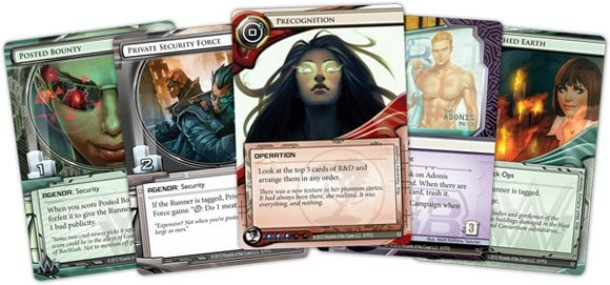
Android: Netrunner
Publisher: Fantasy Flight Games
The Android game universe is one of the coolest and most underappreciated fictions in the tabletop scene. The new revision of Netrunner is set in this rich backdrop, but replicates many of the original mechanics of the 1990s collectible card game of the same name.
Android: Netrunner is a living card game, which means that all the cards you need to play come in the core set, and there are no random boosters that change things up – an appealing concept for players burnt out on the endlessly changing landscape of collectible card games. Subsequent expansions will also offer a static set of cards, so you’ll always know exactly what you’re playing and what cards might show up.
Asymmetric head-to-head gameplay sets one player in control of a futuristic mega-corporation, and the second player in the role of a runner who is trying to infiltrate the company’s systems. Each of the two roles play in dramatically different ways, but remain balanced against each other. This new version of the game also fleshes out your opening game options by putting you in charge of either one of four corporations or one of three runners. The result is a wealth of variety when you come back to play in subsequent sessions.
If you’re a fan of Bladerunner or anything in the cyberpunk fiction genre, Android: Netrunner is an awesome way to get your fix and simultaneously explore a fascinating and unique gameplay model.
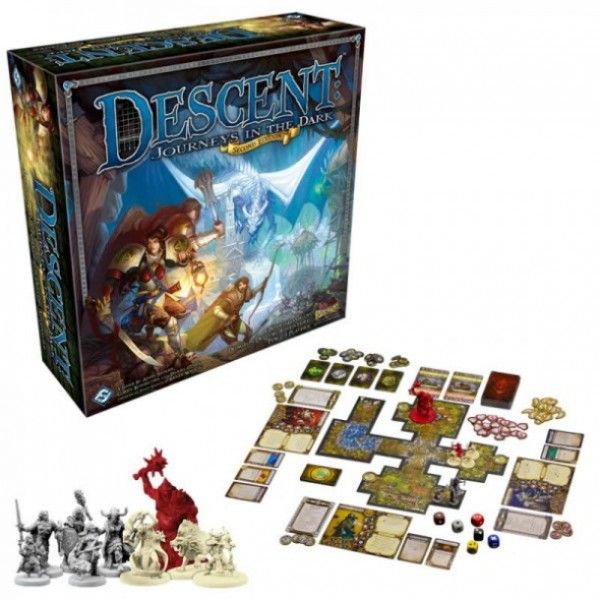
Descent: Journeys in the Dark (Second Edition)
Publisher: Fantasy Flight Games
The original Descent released around seven years ago, and immediately gained popularity for the way it combined the storytelling and dungeon-crawling fun of classic role-playing games with the ease and speed of a board game. The new second edition released this year, and offers a stellar update to the formula and an ideal way for new players to get in on the action.
In Descent, one player takes on the role of the Overlord, and ushers monsters and other dangers into the other players’ paths as they work together to defeat them. Unlike a traditional role-playing game, however, the Overlord isn’t out to assure everyone has a good time – he’s out to win!
Most of the players get to pick between a number of interesting character variations, each of which brings his or her own strengths and abilities to the table. Stick with your character over multiple sessions, and you’ll control his or her growth and changing skills.
Descent’s coolest advancements in the second edition involve increased options to play through a linked series of quests that form into a larger campaign. Depending on whether the overlord or the players win in any given session, different subsequent scenarios unfold, leading up to a tense climax. Even so, the new rules never come close to the complexity or investment involved in a true role-playing game, so the time commitment and rules memorization from players remains in check.
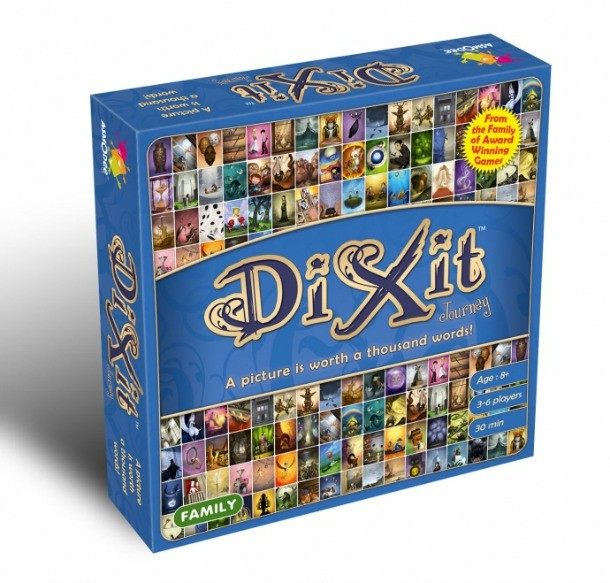
Dixit Journey
Publisher: Asmodee
Whether you pick up the standalone Dixit Journey that came out in 2012 or any of the proceeding excellent games in the series, Dixit won’t disappoint. Ideal for get-togethers with families and friends that don’t normally play tabletop games, Dixit is also a fantastic game to play with kids, letting them express their creativity in a new way.
In Dixit Journey, every player is dealt a hand of cards. Each card depicts a gorgeous, often surreal piece of artwork. One card might show a long road and a lonely figure. Another might exhibit a teddy bear with some dark secret lurking behind him.
On their turn, the active player says a short word or phrase describing one of his or her cards, and places it face down on the table. All the other players look at their cards, and find the card that best matches the spoken phrase. The cards are all shuffled, and then everybody except the active player tries to guess the active player’s card. As active player, if some of the other players guess your card, you win points. If no one or everyone guesses your card, you get no points. Finally, every other player who has someone select their card also scores points as well.
The fascinating but simple premise offers a glimpse into the way your fellow players perceive the images on the cards, and a subtle psychological undercurrent allows each player to strategize about the “story” they’re going to craft about any given card. With multiple stand-alone expansions, it’s hard to imagine ever running out of fun sessions to play.
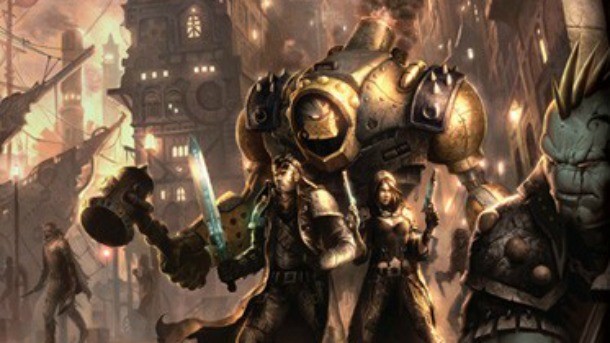
Iron Kingdoms Roleplaying Game Core Rules
Publisher: Privateer Press
Longtime role-playing gamers know the joy of picking up a new RPG sourcebook and diving into a rich setting and ruleset, parsing out its intricacies, and imagining what adventures you’ll go on with your friends. Few RPGs in recent years offer as much promise as the newly released Iron Kindgoms Core Rules.
Miniature gaming fans will recognize that the setting of Iron Kingdoms is the same one encountered in the Warmachine and Hordes games. Unlike those miniature-centric experiences, Iron Kingdoms is a full-on story-driven role-playing game.
The Iron Kingdoms originally emerged years ago as an outgrowth of one of the previous editions of Dungeons & Dragons. This new Iron Kingdoms game uses an entirely new ruleset, but maintains much of the detailed fiction that’s been established over a decade of growth.
That setting is the biggest highlight of the game. Mixing steampunk and magic together in a pre-industrial society, the Iron Kingdoms feels unique from most fantasy experiences on the market. A richly detailed history of different cultures and religions is great fodder for enterprising role-players, and the core rules book is filled with enchanting art that helps to shape a vision of the game world.
Game mechanics are simpler than many tabletop RPGs on the market, based largely around rolling two six-sided dice and adding the result to your character’s appropriate stat for that roll. However, the book gives lots of options for customizing your character with interesting abilities and equipment. One of my favorite features is the way every character chooses two separate careers, letting you craft cool combos, like an alchemist mixed with a soldier.
Iron Kingdoms is still a relatively new RPG in its current form, but new rulebooks are on the way out at a nice pace which will help to expand the available options. Experienced gaming groups that are ready for a break from the standard fantasy or sci-fi setting will find a great alternative by delving into this engaging new system.
[Next up: A comic book RPG, and a cooperative adventure...with mice]

Lords of Waterdeep
Publisher: Wizards of the Coast
Dungeons & Dragons publisher WotC has spent the last few years expanding its repertoire beyond the iconic RPG. Several of its board games have found success, and one of the best came out this year, entitled Lords of Waterdeep. The game ventures out of the dungeon to mix town management with the popular strategic depth of euro-style board games, and the result is an accessible but rewarding play experience.
Players step into the role of one of the mysterious masked lords of the great city, Waterdeep. Your goal is to expand your influence across the great city, and you’ll do so through expansion and intrigue. One of the coolest features of the game is the way you’ll recruit adventurers to go on quests for you, and thereby acquire rewards that bring you closer to victory. The game also looks beautiful, with great art for the city board and cards, and plenty of colorful wooden pieces.
Like most euro-style board games, Lords of Waterdeep emphasizes strategy over luck, keeps rules relatively simple, and has players competing in mostly indirect ways. If you’ve always been curious about learning more about that popular genre of tabletop titles, Lords of Waterdeep is a great introduction backed by plenty of fantasy flavoring.

Marvel Heroic Roleplaying Basic Game
Publisher: Margaret Weis Productions
The new Marvel comics game isn’t the first time designers have tried to fit comic book action into a role-playing setting, but it is one of the best attempts I’ve seen. The colorful and beautifully illustrated basic game rulebook includes easy-to-understand explanations for the game’s concepts, and a smart internal organization that makes it easy to hop to the right page to clarify a rule or term.
The game itself uses the excellent Cortex Plus rules system to present action that is fast, intense, and highly flexible to your style of play. Players and the Watcher (game master) both use pools of different shaped dice to determine the results of their actions, and there’s an interesting element of strategy involved in what dice to use, as well as how you might link actions back to your character’s motivations. The adaptable nature of the rules is ideal for big, epic physical conflicts, but also supports everything from psychic duels to tense arguments.
Marvel Heroic Roleplaying also provides enormous choice in character options. The game book includes 23 pick-up and play characters like Spider-Man, Cyclops, Captain America, Black Widow, and Wolverine. Each character includes detailed game stats, as well as a short-form background to help inform your choice of how to play your character. If none of the included heroes strike your fancy, rules are also included for making your own superhero.
The game is smart, clearly presented, and ideal for any role-playing gaming group looking for something faster paced and dramatic, whether you love Marvel comics or not.

Mice and Mystics
Publisher: Plaid Hat Games
If your family is ready to graduate to higher-end board games, but you’re not convinced that it’s time for cutthroat strategy games, Mice and Mystics may fit the bill. The game is hands-down one of my favorites from this year. It’s also definitely worth a look from more experienced gaming groups who enjoy cooperative storytelling like you see in perennial favorites like Arkham Horror and Pandemic, or for role-playing groups wanting a break from a long campaign.
Up to four mice adventure together through a detailed narrative – each time you play, you can explore a different part of the story, and your characters are always working together to complete the scenario. The players’ characters are out to save the kingdom after being turned into mice, so they have to contend with everything from skittering spiders to the castle housecat while on their journey.
Beautiful production values are on display in every aspect of Mice and Mystics, from the detailed mouse figurines to the vivid and colorful art depicted on the board tiles. Each game session has a modular board, and tiles sometimes flip during play as the mice scale drippy pipes and tiny ladders, or drop down through grates in the floor. A cleverly designed and enjoyable combat system keeps the action tense, and players have lots of choices in abilities, weapons, and other actions on any given turn. Special game-specific dice introduce an element of chance into the proceedings, but careful cooperation can save the team from the worst turns of fate. Plus, the included scenario booklet could keep you playing for months.
[Next up: Fly into into space with Star Wars ships, or track the seasons as a powerful sorcerer]

Seasons
Publisher: Asmodee
Don’t be fooled by the bright colors and exaggerated art style of Seasons. This is a deep and strategic card game with lots of potential avenues to victory.
You control a powerful sorcerer competing against the world’s other great sorcerers through the tournament of the 12 seasons. The seasons manifest on a small, ever-changing board that slowly moves through the 12 months of the year. Each season has its own properties and ways to score victory points, and you work towards playing the various cards in your hand as in-game time passes from year to year.
Gameplay in Seasons is split between two phases. The game opens as each player drafts nine cards for his or her use during the rest of the game. Those cards are split into three groups of three cards each, and each group is rolled into the wider game as the match progresses.
Unlike many traditional card games, the second phase introduces an element of chance, as each player chooses a different die that lets him enact certain abilities on his or her turn. Your choice of what die you pick on each turn helps move you toward victory, from drawing new cards to harvesting elemental energy.
Seasons gets a nod from me this year for its wholly unique gameplay mechanics, its beautiful art and custom dice, and the large number of choices it gives to players on every turn. If you’re a longtime card game enthusiast looking for a change of pace, Seasons might be for you. For folks that really love the game, there's also a new expansion called Enchanted Kingdoms that is more than worth a look.

Star Wars X-Wing
Publisher: Fantasy Flight Games
In a year where Disney took over the Star Wars brand and new movies in the franchise are on the horizon, it’s nice to know that the tabletop gaming rights are in good hands. The folks over at Fantasy Flight crafted a fast and addictive new miniatures game that has players swooping through outer space in X-Wings and TIE Fighters, all the while drawing on a whole slew of weapons and tactics to win the day.
The first thing players will notice about X-Wing is the gorgeous detail on the tiny miniature ships that come with the game. The base game comes with just three ships (one X-Wing and two TIE Fighters), but you can purchase additional ships to expand into larger space battles.
Even so, the base game offers a great tactical challenge without the need for any expansions. Rather than a traditional board, the game can be played in any area where you can clear out a 3’x3’ space, which represents the open space through which your battle occurs. Players take turns enacting maneuvers and actions around the board, banking their ships from side to side, dropping into 180 degree turns, and pulling off barrel rolls. Once in place, ships can target enemy flyers and try to bring them down through an exchange of attack and defense dice.
X-Wing has lots of tactical complexity, but the small size of battles and straightforward rules keep the options from being overwhelming, and help to assure your games conclude with speed and fun.
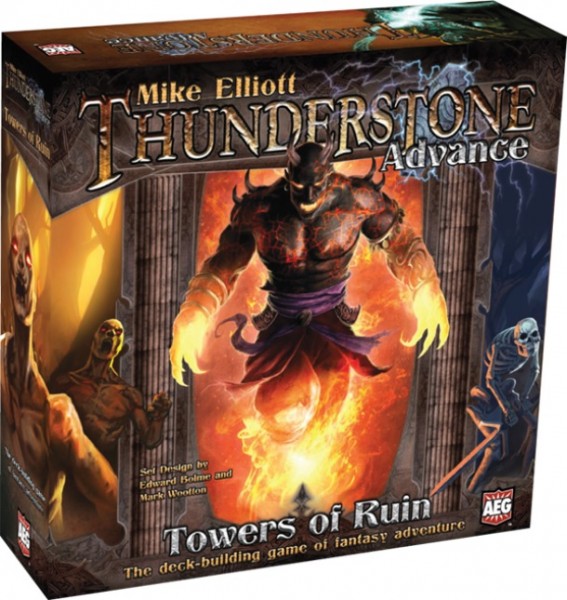
Thunderstone Advance
Publisher: Alderac Entertainment Group
Deckbuilding games are all the rage in the last few years, in which players slowly build up a collection of cards that come back again and again over the course of a game. Thunderstone Advance ties the popular mechanic to the consistently entertaining setting of a dungeon crawler. The game that emerges is a varied and adaptable experience with plenty of adventuring flavor, and a huge degree of replay value.
This competitive game casts each player as a heroic champion in search of ancient relics called Thunderstones. To acquire them, you recruit adventurers into your party and send them deep into a dungeon, fighting monsters along the way, along with the help of equipment cards you’ve added to your deck from shopping back in the village.
A large variety of monsters helps assure that each game you play of Thunderstone Advance feels distinct from the last. In addition, the game’s rulebook comes with several included scenarios that have interesting variations on the base rules. Beyond that, it’s easy to craft your own scenarios for even more replay options.
Players don’t need to be afraid of the “Advance” part of the title. This new release is simply the next evolution in the popular Thunderstone game franchise, and an ideal place to hop on if you haven’t played before. For experienced Thunderstone players, this new game is compatible with your old cards by simply taking note of some minor changes in terminology, and welcoming a few new card types and clarifications.
Looking for where you might track down one or more of the above games? Check out your local hobby and game store, and they’ll likely be able to order up anything you might want. Otherwise, online retailers like Cool Stuff Inc, Thought Hammer, and Amazon should also offer a comprehensive selection.
What 2012 tabletop games did I miss out on? Or what games from previous years also deserve recommendations? Let us know in the comments below.










